STG2 David S. Fones, U.S. Navy – Plan for the Worst, Hope for the Best
It’s easy to measure success in a basketball game or a race. Just look for the team with the most points or the runners with the fastest times. But what if your job is to be incredibly prepared for something you hope will never happen? Such was the case with Sonar Technician Second Class David S. Fones, U.S. Navy. He spent six years training to hunt and kill adversary submarines, ever vigilant and always ready to be called to action but hoping he never would be because it would mean the world was at war. Yet with all this responsibility, he always served as a positive ambassador for the United States in every foreign port his ships called. This is his story.
Dave was born into a family with a proud military heritage. Both of his grandfathers served in combat in Europe during World War I, while his father, Ted Fones, served in the U.S. Army Air Corps in World War II. He was a navigator on a bomber and flew twenty missions over Japan, serving as the lead navigator on seventeen of those missions. After the war, he used his GI Bill benefits to enroll in Bradley University in Peoria, Illinois, a small city located about 170 miles southeast of Chicago, to study engineering.
One other thing Ted Fones did during the war was marry Melba Mae Simpson, his high school sweetheart. She worked as a switchboard operator for the local telephone company until Dave was born in August 1948. That meant Dave’s father had to get a job to support his growing family while still studying at Bradley, so he began working for Caterpillar Inc., a heavy equipment manufacturer headquartered in Peoria. Ultimately, he graduated with his engineering degree and rose to the level of Caterpillar’s Director of Research.
Dave’s parents sent him to Catholic schools, including his all-boy high school, Spalding Institute in downtown Peoria, where he began his freshman year in the fall of 1962. Although he ran varsity cross country, he loved playing pick-up basketball games and became quite good. His focus, though, was his grades and he excelled academically. So much so that after he graduated from Spalding Institute in June 1966, he enrolled in Marquette University in Milwaukee, Wisconsin, and began attending classes in the fall.
At Marquette, Dave got involved in Navy ROTC (Reserve Officers’ Training Corps), a university-level training program designed to qualify participants to serve as commissioned officers in the U.S. Navy. One of the areas he learned about was anti-submarine warfare, which really interested him. This also caused him to think about how the Navy might help him pay for his college education. Because his father was an engineer with Caterpillar, Dave did not qualify for financial aid. That made paying for Dave’s education at a private university like Marquette a strain on the family’s finances, especially since Dave’s parents were still raising his younger brother and younger sister. Accordingly, Dave decided to enlist in the Navy after completing his first year at Marquette so he could use the GI Bill to pay for his education.
Dave followed through with his plan, enlisting for six years in September 1967 at the height of the Vietnam War. After passing his physical and swearing to support and defend the Constitution, he boarded a train in Bloomington-Normal and headed off to boot camp at Naval Training Center, Great Lakes, just north of Chicago. When he and the other new arrivals were divided into companies, Dave was surprised to hear the name of a grade school friend, Rick Heiser, assigned to his company, too. At least he would not be going through the boot camp ordeal alone.
Much to his surprise, Dave did not find boot camp difficult. He already had a crew cut, so the Navy barbers got little satisfaction from the buzz cut they gave him on the first day of training. He had also attended Catholic schools all his life, so it was easy for him to trade the shirt and tie he wore to school each day for a Navy uniform. His Catholic schooling also imbued in him the necessity of following rules, taking the shock of that aspect of boot camp away, too. Finally, he was in great shape and a good swimmer, so he had no problems with the physical training. All this translated into a successful boot camp experience.
Boredom proved to be Dave’s biggest challenge. He found the military adage “hurry up and wait” to be true because in between training activities, he and the other recruits had nothing to do. To remedy this, Dave sent his parents a letter asking them to send him paperback books he could tuck into the back pocket of his dungarees. Then when his company had to sit around and wait, he could pull out a book and read. The solution worked so well Dave vowed he would never be bored again. For the rest of his time in the Navy, he kept a book in his back pocket to call upon when things got slow. Other things that kept Dave from getting bored at boot camp included winning the recruit basketball tournament with his company and standing watch outside in the cold guarding a garbage dumpster to keep enemy spies from stealing anything from it (or so the watchstanders joked among themselves).
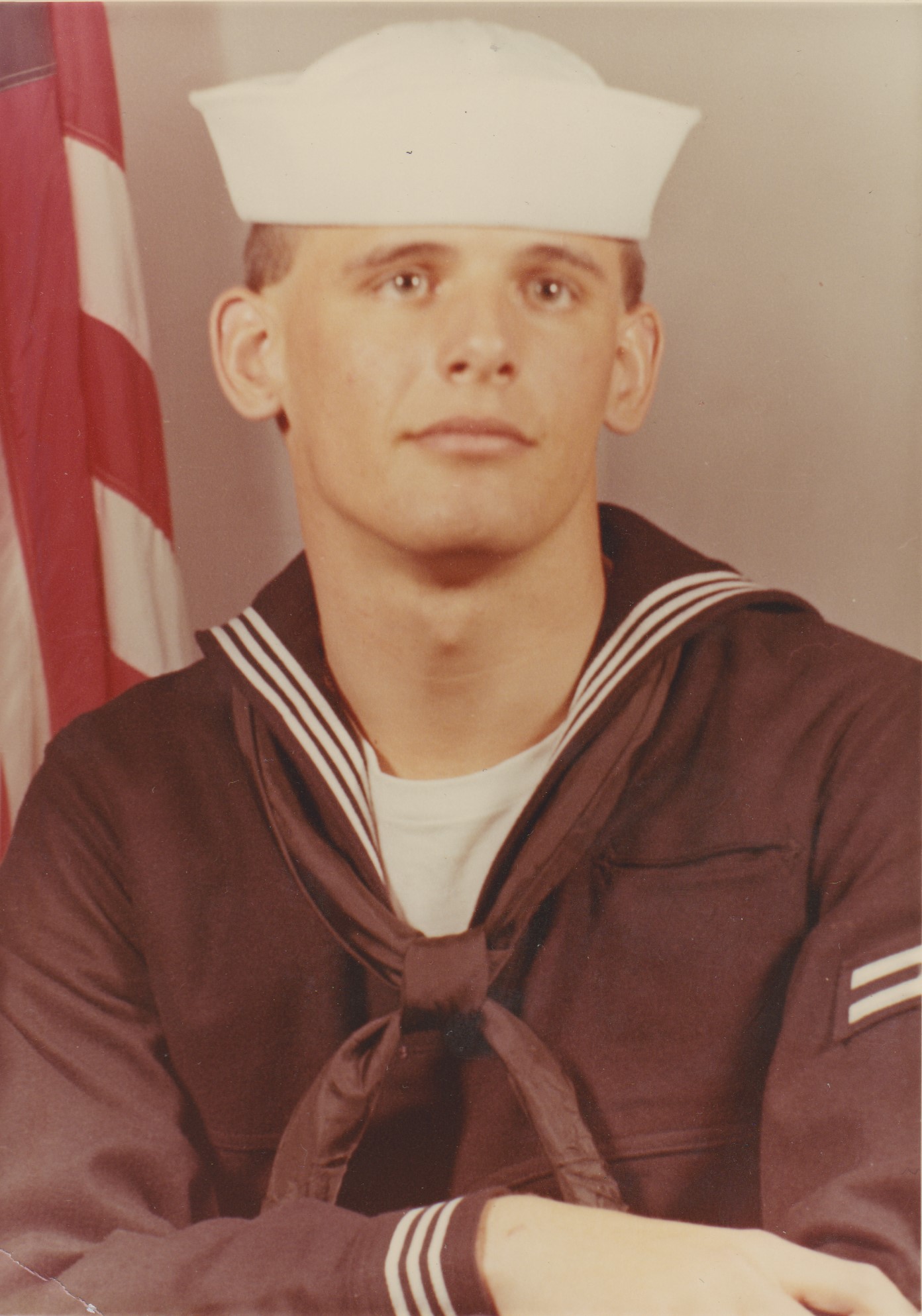
After Dave graduated from boot camp in the late fall of 1967, the Navy put him on the path to becoming a Sonar Technician (abbreviated “STG” for Sonar Technicians serving on surface ships). His first stop was basic electronics “A” school, also located on board Naval Station Great Lakes. Once he had basics down, he transferred to Naval Station Key West in Florida to attend “B” and “C” schools, where he learned how to listen for, identify, and track submerged enemy submarines using sophisticated sonar equipment. He also learned how to program, maintain, repair, and operate a bulky fire control computer to calculate the firing solutions his ship needed to launch weapons to destroy any enemy submarines lurking nearby. Dave described his job as always being ready for the worst in case he was called upon to locate and destroy enemy submarines, but hoping for the best and that war would never come.
As a tropical paradise, Key West offered distractions from the weighty training Dave engaged in during the normal workweek. On weekends when they had liberty, Dave and a friend explored the warm waters of the Caribbean searching for Langosta “spiny” lobsters. They took their catch to the Enlisted Club on base and the cooks prepared the lobsters for free. Dave also played basketball, with his team winning the base championship, and he enjoyed swimming at the base pool at the end of the workday. Still, life at Key West wasn’t all training and fun, especially before the start of each school. During those interim periods Dave and the other sailors waiting for classes to begin did janitorial work, mopping floors, stripping wax from the floors, and then rewaxing them. It was a small price to pay for living in Key West.
After graduating from Sonar Technician “C” school in the summer of 1968, Dave transferred to his first ship, the USS Robert H. McCard (DD-822), homeported in Charleston, South Carolina. The McCard was a destroyer commissioned in October 1946, a year after the end of World War II. Although it had been built at a time when German and Japanese submarines were the ship’s intended targets, McCard’s ability to detect and track Soviet submarines, and destroy them if necessary, made the ship a critical component of the U.S. Atlantic Fleet. Given Dave’s newly earned expertise in operating the sonar equipment underlying the ship’s warfighting capabilities, he immediately became an essential member of the ship’s crew.
Dave reported for duty on the McCard’s quarterdeck around 3:00 a.m. The duty section checked him in and assigned him to the top rack in the corner of his new division’s berthing spaces. Because it was so early in the morning, no one in his division knew he was there so they did not wake him up in the morning. He woke up later on his own, feeling very seasick. He tried to find a head (the Navy’s term for a bathroom) but didn’t know where one was. He started to climb up a ladder to get out of the berthing compartment but threw up before he could leave. At that point he decided the best thing he could do was go back to his rack to sleep until he felt better. He was awakened not long after by a call reporting someone had thrown up on everyone’s clothes in a laundry basket. Just a few hours on board and he’d already left his mark.
Dave’s primary responsibility when he first reported onboard involved conducting preventive maintenance under the watchful eye of an experienced First Class Petty Officer (E-6). This meant performing certain daily, weekly, and monthly checks on the sonar and fire control systems to ensure they were always in working order and prepared for war. The experience he gained soon made him an expert on the ship’s sonar equipment and its Mark 114 underwater fire control system. In fact, Dave had enlisted for six years to obtain his advanced “B” school and “C” school training right after “A” school. Other new sailors in his division had enlisted for only four years, so they did not have the same advanced training. It was Dave’s job to train them to conduct the required preventive maintenance on all their gear.
The Navy tested Dave’s expertise when the Robert H. McCard left Charleston to participate in NATO exercise Silvertower in the North Atlantic during September and October 1968. The North Atlantic seas proved treacherous, battering Dave and the rest of McCard’s crew throughout the exercise. At one point, a helicopter approached the ship with supplies but had to turn away because it was too dangerous to attempt a transfer. The rough seas also made it difficult to keep the ship’s sonar equipment calibrated, requiring Dave to spend countless hours working to maintain its operational readiness. Even the ship itself was damaged, so at the end of the exercise, it had to put in at Portsmouth, England, for repairs. This worked to Dave’s advantage because as a reward for the work he’d done during the exercise, he was granted leave in London. While there he took in all the major sites, including the Tower of London, Westminster Abbey, the Changing of the Guard at Buckingham Palace, and Trafalgar Square, as well as Lord Horatio Nelson’s flagship, HMS Victory, in Portsmouth harbor.
Dave returned to Charleston on the McCard, which then went into the shipyards for an overhaul from December 1968 to April 1969. While the ship was in the yards, the fire control computer Dave worked on had to be replaced. Given the computer’s mammoth size, shipyard workers had to cut a hole in the deck above the computer. Then a crane lowered four hooks at the end of wire ropes to connect to four big eye bolts on the top of the computer console. Dave labeled and disconnected all the computer’s wiring so it could be reconnected to the replacement unit. Finally, the crane hoisted the computer out of the ship and onto a waiting truck. The process was reversed when the replacement unit arrived a few days later.
After the yard period, the McCard began workups off the U.S. Atlantic coast and in the Caribbean in preparation for an upcoming deployment to the Mediterranean Sea. This training period gave Dave the opportunity to practice the sub hunting skills he’d learned at “C” School, including using his sonar equipment to listen for submerged U.S. submarines making practice attacks against U.S. Navy surface vessels. The job was part skill and part art, as Dave had to calibrate both the equipment and his ears to discern whether a submerged submarine was approaching his ship, departing the area, or heading on a parallel course. Then he worked closely with those manning the ship’s weapons – torpedoes and ASROCs (anti-submarine rockets) – to successfully simulate an attack on the submarine. Data extracted from the dummy weapons used in the simulation measured Dave’s success. In the event of war, his success would be measured instead by the lives he saved from an attack by an enemy sub.
Once McCard and her crew completed their training requirements in the Caribbean and made port calls at area islands for some much-needed stress relief, the ship returned to Charleston. Then, in September 1969, McCard got underway for a six-month deployment to the Mediterranean Sea, where it conducted operations with the ships of the U.S. Sixth Fleet.
Dave and the McCard returned to Charleston on March 28, 1970, after completing their Mediterranean assignment. Later that year, the ship began the workup cycle again, training off the Atlantic coast and in the Caribbean to prepare for yet another deployment to the Mediterranean Sea. This time, Dave and the ship left Charleston on April 15, 1971, and returned on October 16, 1971, completing Dave’s second sixth-month deployment in less than two years.
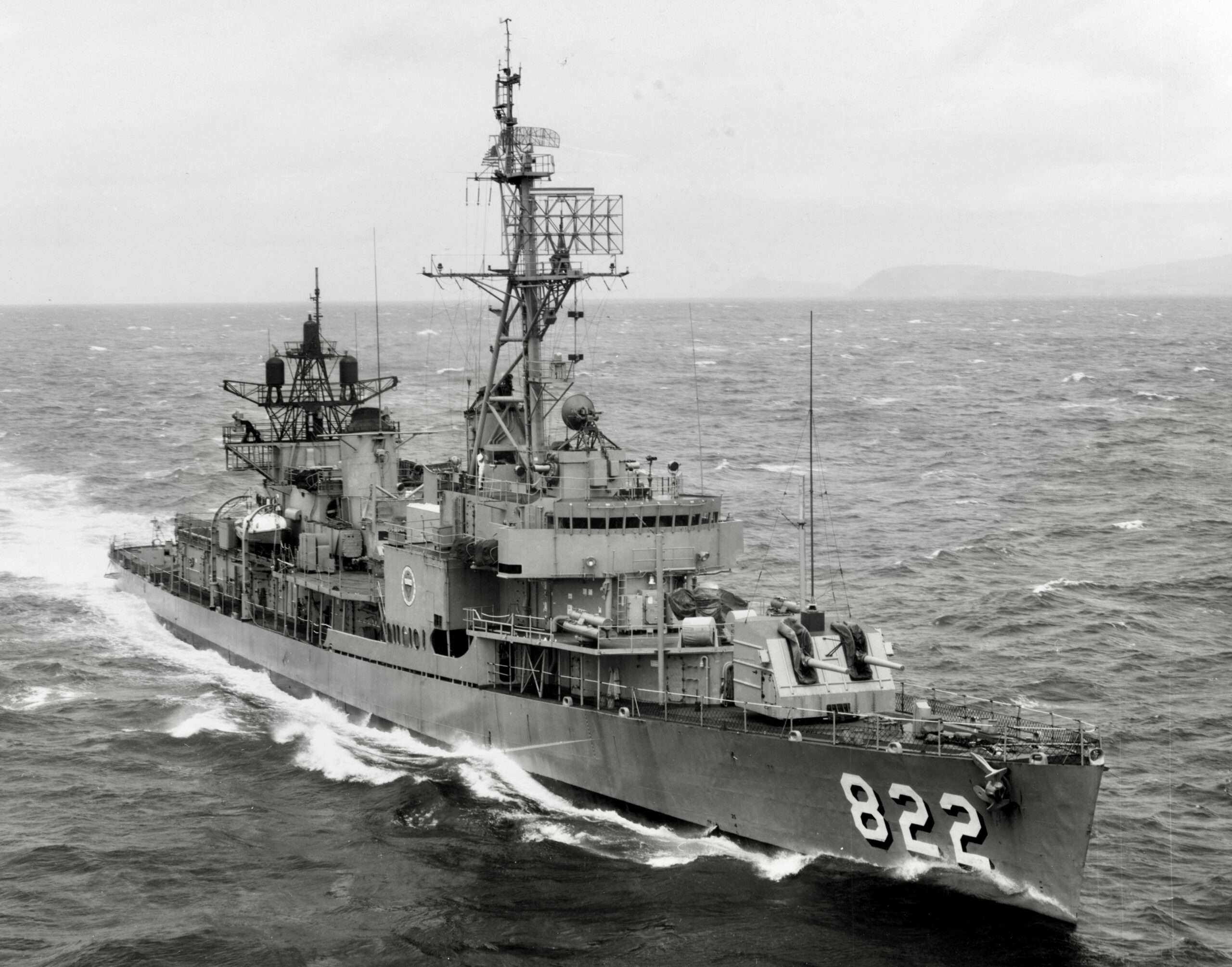
During both “Med” deployments, the McCard made port calls in various allied countries, demonstrating U.S. resolve and capability during some of the tensest times of the decades long Cold War. Two examples illustrate the roles Dave and the McCard played in what often turned out to be a cat-and-mouse game at sea.
On February 3, 1970, the McCard was operating together with the light cruiser USS Little Rock (CL-92), when the Little Rock made sonar contact with a suspected submarine. The McCard was called in to prosecute the contact, with Dave’s team of Sonar Technicians taking center stage. The McCard conducted a simulated attack on the submarine, using it as a training event to hone its sub hunting skills. The reality of the situation came to light when a submarine’s periscope was sighted nearby.
On another occasion, intelligence reports indicated the Russian helicopter carrier Moskva would soon emerge from the Black Sea through the Turkish Straits. McCard was given the task of trailing her in the Mediterranean until she was relieved by another ship to continue the trail. As the intelligence report did not indicate exactly when the Moskva would emerge, McCard took station off the coast of Turkey and waited. After about a week, the Moskva appeared, and McCard shadowed the Soviet ship at a safe distance. While Dave found this exciting at first, the excitement wore off quickly when McCard started to run out of fresh fruits and vegetables and other supplies. While McCard was supposed to be relieved by another Sixth Fleet ship, conducting a turnover rendezvous was difficult because only the Moskva new where she was going. Eventually the turnover occurred, but not before Dave and the rest of the crew had eaten mostly powdered eggs and “bug juice” (generic Kool-Aid) for days.
The best parts about Dave’s two deployments to the Mediterranean Sea were the port calls McCard made and the countries Dave got to visit. These included stops in Spain, France, Italy, and Greece, with each country’s culture and history being older than the last. Dave particularly enjoyed his time in Greece, where two events stand out.
The first involved an excursion to tour Olympia, the site of the ancient Olympics in Greece. He rented a car to drive there himself, but missed a sign along the way telling him to turn right. After going some distance in the wrong direction across paved, then cinder, and then dirt roads, he came upon a family spreading grapes from their farm onto tarps to let the sun turn them into raisins, their primary cash crop. He got out of his car and asked the family if they could show him how to get to Olympia. The father of the family smiled – he had been a merchant seaman and not only spoke some English but had worked with Americans before. Plus, he saw this as an opportunity for his teenage daughter to practice the English she was learning in school with a real American. “Of course,” he said, “but you must stay and have dinner first.”
Thinking this would be a memorable experience, Dave returned with the family to their home, a small adobe hut with an awning covering an open front porch. Inside the hut was the kitchen and the place the family’s children slept, while the farmer and his wife slept on a brass bed on the open-air porch.
To prepare for dinner, the farmer sent his son and Dave to the nearby river to catch some fish and to bring back two beers he kept cool in the river. When they returned, they found the farmer’s wife preparing a fresh chicken. Dave ended up having a wonderful dinner with the family, experiencing Greek life in a way he never expected. When Dave was finally ready to go, he thanked the family and asked how to get to Olympia. The farmer replied they would get him on his way, but not until the next morning. That night, the farmer gave Dave the brass bed under the awning on the open-air porch, while the farmer and his wife slept inside with their children. The next day, they sent Dave off in the right direction after Dave bought them breakfast and said goodbye. He continued to correspond with the family for years afterwards.
The second experience involved a trip Dave made to the southernmost point on Greece’s Peloponnese peninsula. After touring the ancient Greek amphitheater in Epidaurus, he arrived in a coastal town around 9:00 p.m. to check into a family-run hotel where he had made reservations. He found the front desk manned by a teenage boy who told him they thought he wasn’t coming because it was late, so they had given his room away. Dave said he understood and left to find another room in town. As he started to drive slowly through the town’s streets, he saw a commotion in the rear-view mirror and children running after him. He circled back to see what was going on and learned the town’s families were arguing about who would get to host the tall American visitor. Needless to say, Dave had no trouble finding a place to stay that night.
Both these experiences occurred because of Dave’s approach to port visits. Using travel guidebooks he’d acquired along the way, he planned each visit to take advantage of every opportunity a country had to offer. He especially loved meeting local people and learning about their culture. For these two reasons, he considers his Greek experiences priceless.
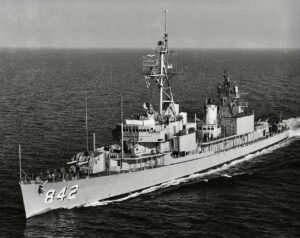
After returning from his second deployment, Dave transferred from the USS Robert H. McCard to another Gearing class destroyer, the USS Fiske (DD-842). This meant moving north because the Fiske was homeported in Newport, Rhode Island. Dave’s duties onboard were essentially the same as those onboard the McCard, although now he was an experienced Sonar Technician Second Class (STG2). His expertise, however, extended well beyond sonar. The Fiske’s commanding officer recognized this by presenting Dave with a letter of commendation for the many hours he put in as a member of the ship’s ASROC handling team preparing the ship for its nuclear weapons acceptance inspection at the end of 1972.
Dave did one deployment onboard the Fiske, which began in January 1973. The ship was initially headed for the coast of Vietnam, but when it was announced on January 27, 1973, that all U.S. troops would be withdrawn from Vietnam within sixty days, the ship’s mission changed. Instead, after crossing the equator in the Atlantic Ocean and rounding the Cape of Good Hope at the southern tip of Africa, the ship headed north through the Indian Ocean to Pakistan.
During this cruise, the Fiske made two port visits that are especially memorable for Dave. The first was in Mombasa Kenya, where Dave finagled two weeks leave. Normally, leave for such a long period during a deployment was impossible, but the Chief of Naval Operations (CNO) had recently released a memo saying too many sailors were being discharged with large leave balances, requiring the Navy to pay them for their unused leave on their way out. As Dave was scheduled to be discharged as soon as the ship returned to Newport, Rhode Island, and had a large leave balance on the books, he submitted the CNO’s memo with his third leave request, the first two having been denied. He was subsequently told to report to the captain’s office, where both the captain and the executive officer grilled him about his plans. Finally, they asked “what are you going to do if the ship’s schedule changes and you can’t get back to the ship before we pull out of port?” Ready for the question, Dave produced his credit card and said he could make the necessary travel arrangements to rejoin the ship later. Satisfied Dave had a plan and could handle himself, they approved Dave’s leave.

As a result of his persistence and planning, Dave spent two exciting weeks in Kenya. He started by taking a taxi with five other people to Nairobi, located 300 miles away. During the drive, he sat next to a professional photographer, who told him how to take pictures of animals in the wild. Dave put the lessons to good use during a safari, where he saw and photographed elephants, lions, giraffes, cheetahs, and zebras. One of the cheetahs even posed by laying on the hood of his Land Rover, apparently enjoying the engine’s warmth. Dave also saw lion cubs playing under the watchful eye of their mother and an alligator sunning himself on a flat rock. The alligator was invisible until his guide pointed it out and explained the danger alligators posed to villagers filling jugs of water along the river’s banks. In addition to the many photos he took, Dave hauled back to the ship a large shield and two spears he purchased in a remote village, all three items being used by young boys as part of their test to cross the bridge to manhood.
The other notable port call was in Massawa, Ethiopia (today Massawa is in Eritrea), where Ethiopian Emperor Haile Selassie came onboard the Fiske. The emperor inspected the crew while onboard, passing directly in front of Dave, who towered over him as the emperor was very small in stature.
The Fiske returned to its homeport in Newport, Rhode Island, in July 1973. By that time, Dave had less than ninety days to serve on his six-year enlistment, so he qualified for an early discharge. This he took in August 1973 after passing his discharge physical. He then loaded up his car and headed back to Peoria, Illinois.
Once back in Peoria, Dave used his GI Bill to pay for his college education, enrolling in Illinois State University in Normal, Illinois. While there, he met a dormitory management assistant named Ari who had a Greek accent. Dave asked him where he was from and Ari replied the southern tip of the Peloponnese peninsula in Greece. When Dave asked what he did there, he said he worked at his family’s hotel. Then, by incredible coincidence, they realized Ari was the teenage boy who told Dave they had given away his room at the hotel when he arrived later than expected after visiting the amphitheater in Epidaurus.
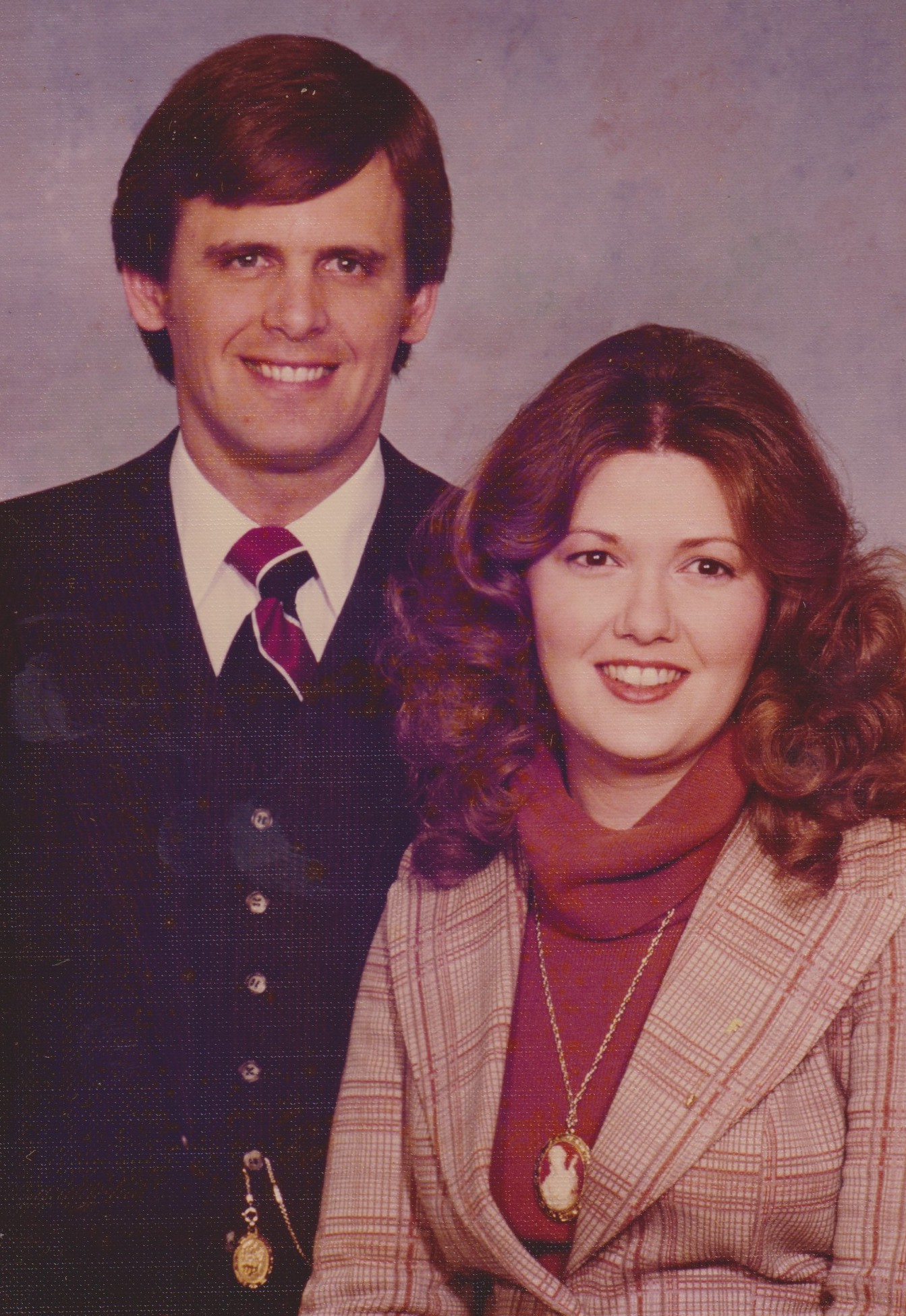
Dave met one other significant person at Illinois State, a graduate student named Susie. They fell in love and were married in 1977, the year after Dave earned bachelor’s degrees in Physical Education and Marketing Education. Since then, Dave has had a successful career in business and teaching, including coaching both tennis and basketball at the high school level. Moreover, he and Susie have two boys, one who followed in Dave’s footsteps by joining the military (Army) and the other who followed in Dave’s footsteps by becoming a teacher.
Dave and Susie are now retired, but Dave remains active, particularly in support groups helping people deal with serious health challenges similar to those he has experienced. In fact, Dave serves as an Ambassador for the Head and Neck Cancer Alliance, giving presentations to organizations about head and neck cancer to promote awareness and provide support for those suffering from the disease. In addition, he walks five miles every day and has covered 15,000 miles since he began in 2016 after his father died. He also speaks publicly about his military experience and that of his grandfathers, his father, and his son, reminding the public of what it means to serve.
Voices to Veterans is proud to salute Sonar Technician Second Class David S. Fones for his dedicated service in the Navy from 1967-1973. Sailing on two destroyers across the Atlantic and Indian Oceans, he maintained constant readiness to protect the fleet from adversary submarines. He went wherever and whenever the Navy called, putting his civilian life on hold and serving as an outstanding ambassador for America in every country he visited. We thank him for all he has done and wish him fair winds and following seas.
If you enjoyed Dave’s story, please sign up for the Voices to Veterans Spotlight monthly newsletter by clicking here. Once each month, you’ll receive a new written veteran’s story directly in your mailbox. Best of all, it’s free and you can unsubscribe at any time.

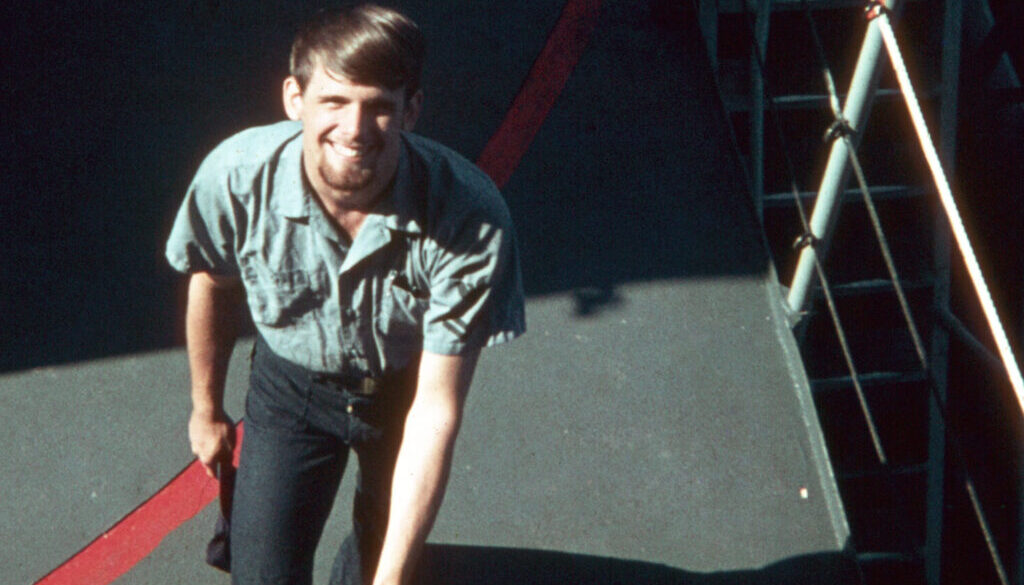
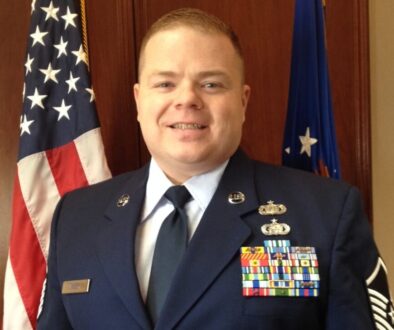
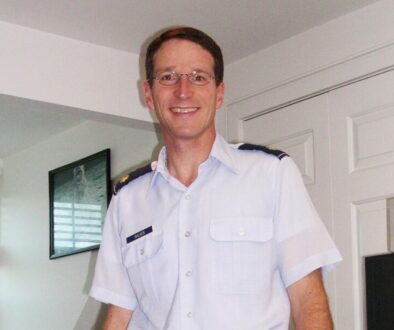
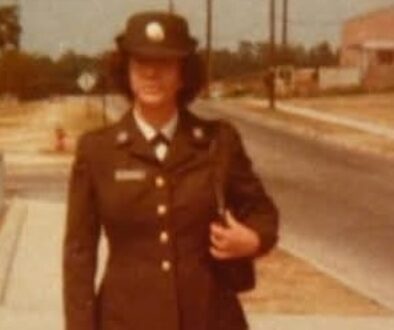
December 28, 2023 @ 6:14 PM
Dave’s service to others continued after his military career. He taught for many years at Champaign Central High School in Champaign, Illinois, where, when he discovered the graduation rate was lower than he thought acceptable, he approached the principal and asked if he could have a class comprised of the students most likely to drop out. That became the composition of some of his classes for the rest of his career, and it became a common practice for graduates to return randomly and interrupt one of his classes to tell the current students how Mr. Fones had changed their life for the better. A few of them returned the favor when they became part of his cancer diagnosis and treatment. I’m very proud of my big brother, who continues to inspire me!
December 28, 2023 @ 7:58 PM
Michael – thanks for your post!